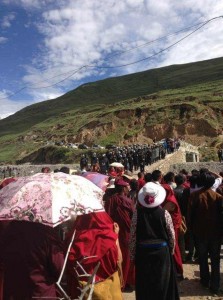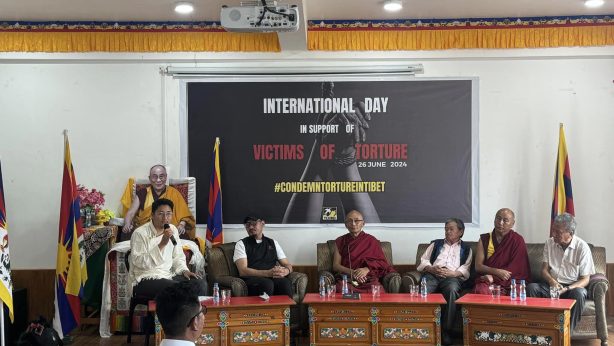China tightens the screw after shooting Tibetan worshippers in Tawu

China has launched a crackdown on local Tibetans who had organised a religious ceremony to observe the birthday of Tibetan spiritual leader, His Holiness the Dalai Lama last month in Tawu (Ch: Dawu/Daofu) County in Kardze (Ch: Ganzi) Tibetan Autonomous Prefecture, Sichuan Province, in the Tibetan province of Kham.
On 6 July 2013, China’s People’s Armed Police (PAP) beat and fired teargas and live ammunition on hundreds of Tibetans who had gathered near Machen Pomra Mountain in Tawu to offer the ritual of incense-burning to celebrate the birthday of the Dalai Lama. At least 14 known Tibetans were injured in the firing and others were detained.
Since then, local authorities in Tawu have intensified surveillance and monitoring of local Tibetans and announced strict punitive measures against local officials and cadres for failing to ‘maintain stability’. Local authorities have vowed to crack down on any signs of ‘separatist’ sentiments and activities by implementing five major ‘stability maintenance’ measures in Tawu County, according to a report published in the official Ganzi Daily newspaper. (Also click here for related report in Chinese language)
In this regard, local authorities have opened five new police stations in Tawu area to crush any opposition against the Chinese government.
The main thrust of the above mentioned five ‘stability maintenance’ measures is to tighten the screws on lower level of government officials and Party cadres. This is aimed at neutralising those officials and cadres who may harbour sentiments and attitudes favourable to the interests of local Tibetans.
The report said only well-experienced County and Township level cadres would be appointed to counter the problems of inefficiency and non-performance by officials and cadres at the grass roots levels. Officials and cadres at township and County level including the new recruits with no such experience would be first sent to townships and villages to gain experience at ‘stability maintenance’. All officials and cadres would now be transferred once every three years to a different area; and in future, 50 percent of County cadres should have experience working in townships and villages.
The second measure is to ensure that the political stand of the local officials and cadres is firm and strong. Those failing this test would be removed from their positions and serious investigations would be launched regarding their [political] background so as to rectify their political attitude. Cadres involved in acts of ‘separatism’ would be punished and denied their salary. Further, cadres have to organise at least one meeting every week in areas under their jurisdiction. Three cadres would be invited [from other Tibetan areas] to help organise these meetings twice a year. These so-called village meetings include running propaganda programs such as ‘patriotic education’ campaign and ‘legal education’ campaign. In both these campaigns, government and Party cadres force Tibetans to denounce the Dalai Lama and pledge their support and loyalty to the Party and the government.
The third measure demonstrates the implementation of human surveillance network in Tawu areas. County and Township officials are required to “live, eat and work” for at least 10 days in every six months in the homes of Tibetan nomads and farmers, including periodic visits to homes of local villagers as well as monastic institutions. These visits are especially targeted at putting “sensitive and trouble-making villages” under surveillance. Cadres and work teams in towns and villages have to “live, eat and work” in Tibetan families for 10 days in every three to six months. Work teams would run propaganda meetings once a week in these villages. Each work team consisting of two to five people will visit Tibetan villages and live with Tibetan families on appropriate time.
The fourth measure is aimed at monitoring local Tibetans by dividing every Tibetan village into specific units and work teams charged with these units are given specific responsibilities at ‘maintaining stability’. Designed along the lines of the controversial Grid Management system, this arrangement would ensure the penetration of Party cadres and their propaganda activities into each Tibetan family and Tibetan village in Tawu area.
The fifth measure concerns the investigation and punishment of grassroots level officials and cadres to root out ‘separatist’ elements. Local authorities have declared that strict investigations would be conducted into the activities and backgrounds of village level cadres to ensure grassroots stability. In this regard, particular attention would be paid to the appointment and transfer of grassroots cadres. Cadres involved in ‘separatist acts’ will have their salaries cancelled or withdrawn completely; depending upon the seriousness of their acts, they will be either dismissed from their jobs, or transferred to other areas possibly with demotion.
The dismissal and demotion of local officials and cadres for failing to strictly maintain stability is not new. In fact, this process has intensified since late 2011 in the backdrop of relentless self-immolations and other protests by Tibetans since the violent crackdown on 2008 protests in Tibet. The stress on ‘stability maintenance’ – a euphemism for suppression of all kinds of opposition against the government at the cost of widespread and systematic abuse of human rights – has led to the demotion and dismissal of cadres and officials of Tibetan descent who form the majority of grassroots administration until in recent years. In May 2012, at least 19 Tibetan and Chinese cadres were either dismissed or demoted for failing to strictly maintaining stability in Tibetan areas.


